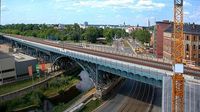On March 19, 2025, the prestigious German Bridge Construction Prize was awarded in Dresden, celebrating exceptional engineering achievements in bridge design and construction. The event highlighted the significance of modern innovations in the field, with several awarded projects showcasing both aesthetic appeal and sustainable practices.
The Bastionskronenpfad Petersberg in Erfurt emerged as the main awardee in the category for foot and cycle bridges. This pedestrian bridge stands impressively at a height of 13.5 meters, connecting the Kilian and Martin bastions with elegance. Built in 2023, the 108-meter-long bridge was lauded by the jury for its unique integration of historical preservation with modern engineering techniques. Commenting on the bridge, the jury remarked, "A breathtaking tourist highlight has been created that establishes a fascinating dialogue between the old and the new."
Also receiving accolades was the Oderbrücke, a remarkable 290-meter-long border bridge between Germany and Poland. The jury praised it as "an engineering masterpiece," highlighting its modern design paired with functional elegance. This bridge, crucial for connecting two nations, showcases advancements in civil engineering, emphasizing efficiency without compromising aesthetic value.
The evening also honored the Chemnitz Railway Viaduct, which garnered the special prize in the monument category. This structure, originally built between 1901 and 1909, spans 275 meters and has undergone extensive renovations from 2022 to 2024. The jury commended the nearly complete preservation of its original components alongside updates that reflect contemporary architectural practices. They stated, "A highly challenging engineering task has been solved exemplary, creating a sustainable example for the preservation of identity-forming monuments.
Finally, the Neue Regenbrücke in Roding received accolades for sustainability, further demonstrating the event's commitment to recognizing environmentally-conscious construction practices.
The Elizabeth Bridge in Halle (Saale) was also acknowledged for fulfilling modern and efficient construction methods. It replaces an older bridge from the DDR era and was constructed using a significant degree of prefabrication, resulting in a notably short construction time and minimal ecological impact. According to the jury, "The replacement construction, utilizing a high level of prefabrication, is characterized by impressively short construction time and a low ecological footprint."
This honors not only the incredible technical skills of contemporary engineers but also reinforces the importance of sustainable methods in construction. This biennial event is organized by the Federal Chamber of Engineers and the Association of Consulting Engineers, showcasing Germany's continuing commitment to engineering excellence. The award aims to appreciate and promote the integration of sustainable methods in bridge construction, encouraging engineers to engage in practices that protect historical integrity while meeting modern needs.
The ceremony concludes with a call to action for future innovations in bridge engineering, as the awarded projects exemplify the perfect balance between maintaining cultural heritage and forging ahead with modern design principles. As the need for more environmentally friendly infrastructure grows, the German Bridge Construction Prize emphasizes that it is not merely about building structures but also about creating lasting connections—between the past and the present, the old and the new.


